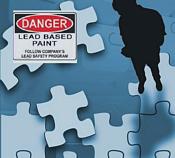RRP Training Refresher: Health Risks of Lead
It’s probably been a while since you took your RRP Certified Renovator Training Class. This blog post is offered as a refresher topic to help you keep important details about the RRP rule top of mind when selling, estimating or performing RRP renovations.
Lead poisoning does not always have obvious symptoms
The symptoms of lead poisoning are often non-specific, and are frequently attributed to other causes. Specific symptoms that people with lead exposure sometimes complain of include:
- Headache
- Stomach ache
- Irritability
- Fatigue
- Loss of appetite
- Joint and/or muscle pain
Because many symptoms are non-specific or similar to flu symptoms, parents may not be alerted to get immediate medical attention for their children. This is critical for young children. The longer a young child stays untreated, the higher the risk of permanent brain damage.
 Workers with an occupational exposure to lead need to inform their doctors in order to give them all the background needed for an adequate evaluation of symptoms as possibly related to lead exposure.
Workers with an occupational exposure to lead need to inform their doctors in order to give them all the background needed for an adequate evaluation of symptoms as possibly related to lead exposure.The best way to determine if lead is present in the body is by testing blood.
Children under six are most at risk from small amounts of lead.
Children are at a greater risk than adults because their bodies are developing. During normal and frequent playing or hand-to-mouth activity, children may swallow or inhale dust from their hands, toys, food or other objects.
In children, lead can cause:
 Nervous system and kidney damage.
Nervous system and kidney damage.- Decreased intelligence, attention deficit disorder, and learning disabilities.
- Speech, language, and behavior problems.
Among adults, pregnant women are especially at risk from exposure to lead.
Lead is passed from the mother to the fetus and can cause:
 Miscarriages
Miscarriages- Premature births
- Brain damage
- Low birth weight
Are you noticing any of the following about yourself or your co-workers?
Health effects of lead in adults include:
 High blood pressure
High blood pressure- Fertility problems in men and women
 Digestive problems
Digestive problems- Nerve disorders
- Memory and concentration problems
- Sexual disorders
- Muscle or joint pain.

 Looking for accurate information about the EPA RRP rule?
Looking for accurate information about the EPA RRP rule? 



